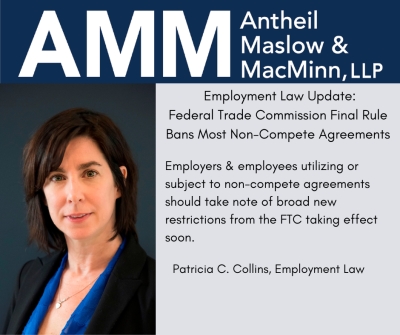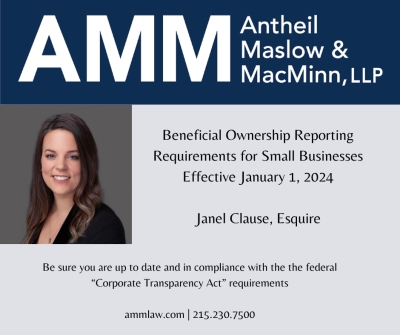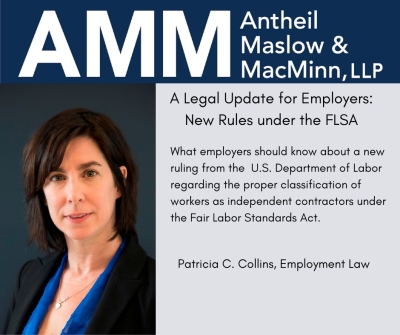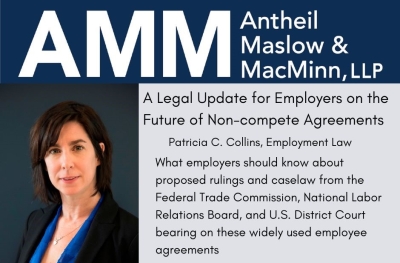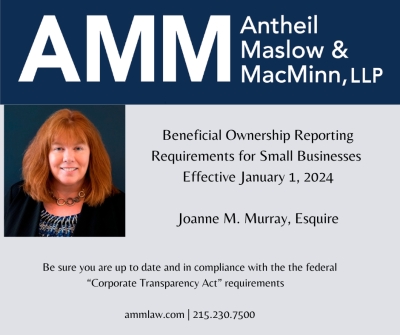AMM Blog
Welcome to the AMM Law Blog, a tool to help you keep up to date on current legal developments over the broad spectrum of our practice areas. We welcome your comments and suggestions to create a dynamic forum that will be of interest to readers and participants.
FTC Non-Compete Rule: Legal Challenges Complicate the Compliance Timeline
Written by Patricia Collins Thursday, June 27 2024 13:52
Reprinted with permission from the June 8th edition of The Legal Intelligencer. (c) 2024 ALM Media Properties. Further duplication without permission is prohibited.
On April 23, 2023, the Federal Trade Commission (“FTC”) issued a final rule imposing a broad restrictions on non-competition agreements (“Final Rule”). The Final Rule requires employers to rescind existing non-compete agreements, and preempts conflicting state laws. The Final Rule is effective on September 4, 2024. In the meantime, there were three cases filed (one of which has been dismissed) that may result in a stay of implementation of the rule. This creates uncertainty for employers and employees in preparing for the effective date of the Final Rule. The Final Rule dramatically impacts both employers and employees. Employees subject to these agreements, and contemplating a move, may be waiting for September 4, 2024 to make decisions. Employers must prepare to determine to whom they will send rescission notices, and what steps they will take to ensure protection of trade secrets and customer relationships.
The Final Rule defines “non-compete clauses” as follows: any agreement that prevents a worker from, or penalizes a worker for, seeking or attempting to seek employment with any employer after the termination of their current employment. The Final Rule mandates that it is a prohibited unfair method of competition to enter into or “attempt to enter into” a non-compete clause with an employee, or to enforce an existing non-compete agreement, or to represent to an employee that they are subject to a non-compete without a good faith basis to believe they are.
The Federal Trade Commission's Final Rule Bans Most Non-Competes
Written by Patricia Collins Wednesday, April 24 2024 15:03
On April 23, 2023, the Federal Trade Commission (“FTC”) issued a final rule imposing a broad restriction on non-competition agreements (“Final Rule”). The Final Rule requires employers to rescind existing non-compete agreements and would preempt conflicting state laws. The Final Rule is effective 120 days from its publication in the Final Register.
The Final Rule defines “non-compete clauses” as follows: any agreement that prevents a worker from, or penalizes a worker for, seeking or attempting to seek employment with any employer after the termination of their current employment.
The Final Rule mandates that it is a prohibited unfair method of competition to enter into or “attempt to enter into” a non-compete clause with an employee, or to enforce an existing non-compete agreement, or to represent to an employee that they are subject to a non-compete without a good faith basis to believe they are.
Accordingly, the Final Rule not only requires employers not to enter into or “attempt to enter into” employee non-compete agreements, it also requires employers to rescind their existing non-compete agreements, and then notify the current and former employees that the non-compete is rescinded within forty-five days of the rescission. The Final Rule provides a form for the notice of rescission. The obligation to rescind existing non-compete clauses does not apply to where a cause of action related to a non-compete clause accrued prior to the effective date.
As Promised: Beneficial Ownership Reporting Requirements Went Into Effect January 1, 2024
Written by Janel Clause Wednesday, March 06 2024 15:06
For the past couple years, we warned you in our business law blog that this time would come. It’s here; the federal Corporate Transparency Act (the “Act”), requiring many businesses to report beneficial ownership information about their owners and anyone with substantial control of the company, went into effect on January 1, 2024. This means that any “reporting company” in existence prior to January 1, 2024 has until January 1, 2025 to report; any reporting company that was formed on or after January 1, 2024 but before January 1, 2025 has 90 days after formation to report; and any reporting company formed on or after January 1, 2025 has 30 days after formation to report.
It should be noted that on March 1, 2024, the United States District Court for the Northern District of Alabama held that the Act was unconstitutional because Congress exceeded its authority. National Small Business United d/b/a the National Small Business Association, et al. v. Yellen, Case No. 5:22-cv-1448-LCB. The Financial Crimes Enforcement Network (FinCEN), the agency overseeing the administration of the Act, has announced that it will abide by the court’s order for as long as it remains in effect. This means that it will not seek enforcement against the plaintiffs in the case (Isaac Winkles, reporting companies of which Mr. Winkles is a beneficial owner or applicant, and members of the National Small Business Association as of March 1, 2024). It seems likely that this decision will be appealed. In the meantime, we encourage all entities formed after January 1, 2024 (other than those who were members of the National Small Business Association as of March 1, 2024) to comply with the Act given the 90-day compliance period. Entities already in existence on January 1, 2024 may want to await further developments given that their compliance deadline is months away.
The Department of Labor's New Independent Contractor Rule
Written by Patricia Collins Thursday, February 15 2024 15:12Reprinted with permission from the February June 13th edition of The Legal Intelligencer. (c) 2024 ALM Media Properties. Further duplication without permission is prohibited.
On January 9, 2023, the United States Department of Labor issued a new final rule regarding the proper classification of workers as independent contractors under the Fair Labor Standards Act. While the rule is technically new, it is, in substance, a recitation of the applicable law regarding the proper classification of workers set forth by the Supreme Court.
Prior to recent rule making, caselaw guided the determination of whether a worker was an employee or independent contractor under the Fair Labor Standards Act (“FLSA”). In United States v. Silk, the United States Supreme Court outlined the factors relevant to the determination: degree of control, opportunities for profit or loss, investment in facilities, permanency of relations and skill required in the claimed independent operation. The Silk court noted that “no one factor is controlling.” Just about every court, federal or state, applies the same or similar standard to determine the issue under the FLSA or state statutes regarding minimum wage and overtime pay.
The Federal Trade Commission's Campaign to Eliminate Non-Competes
Written by Patricia Collins Friday, October 20 2023 15:19
Reprinted from the October 18th edition of The Legal Intelligencer. (c) 2023 ALM Media Properties. Further duplication without permission is prohibited.
On January 5, 2023, the Federal Trade Commission (“FTC”) issued a proposed final rule that would result in a ban of non-compete agreements, and would require employers to rescind existing non-compete agreements. The public comment period for the rule terminated on April 19, 2023, but the FTC has acted aggressively to ban non-competes in the meantime. The FTC has filed complaints against companies that use non-compete agreements, resulting in consent orders that accomplish the recission of hundreds of existing non-compete agreements. The United States Department of Labor, the National Labor Relations Board and even the courts have also taken steps to deter the use of non-compete agreements.
They Are Here: Beneficial Ownership Reporting Requirements for Small Businesses Go Into Effect January 1, 2024
Written by Joanne Murray Friday, October 06 2023 14:04Last year, we warned you in our business law blog that a new law, the federal Corporate Transparency Act, would be going into effect that would require many businesses to provide information about their owners and anyone who controls the company to the federal government. We now know that this law will take effect on January 1, 2024. Reporting companies in existence prior to that date have until January 1, 2025 to comply; companies formed on or after that date must comply within 30 days after formation. Once the data has been entered, companies are obligated to update any information that becomes outdated or is incorrect. The information will be included in a database that will be used to combat money laundering, financing of terrorism, and other illegal activities.


